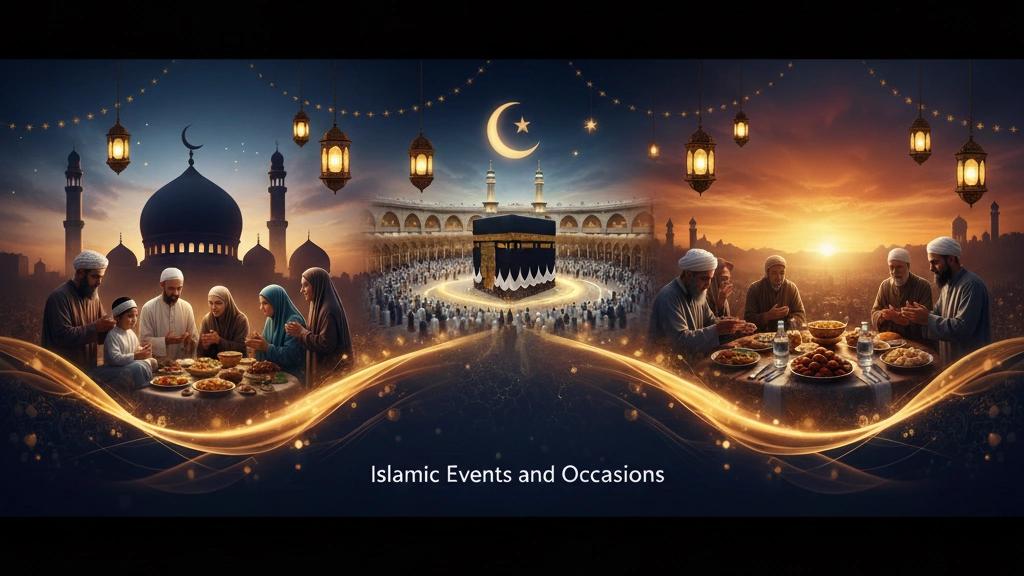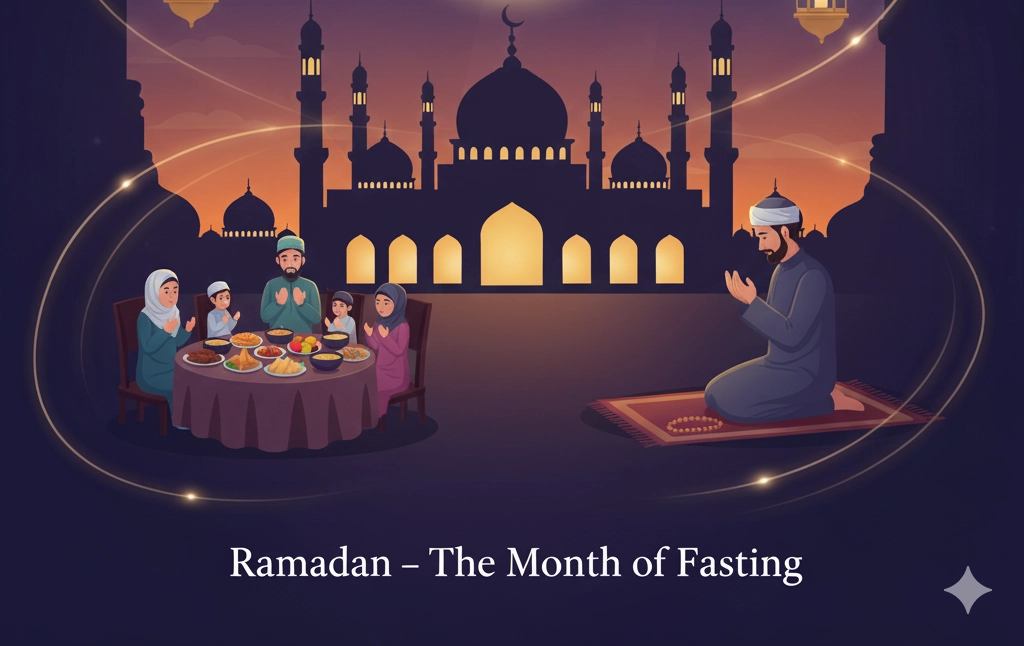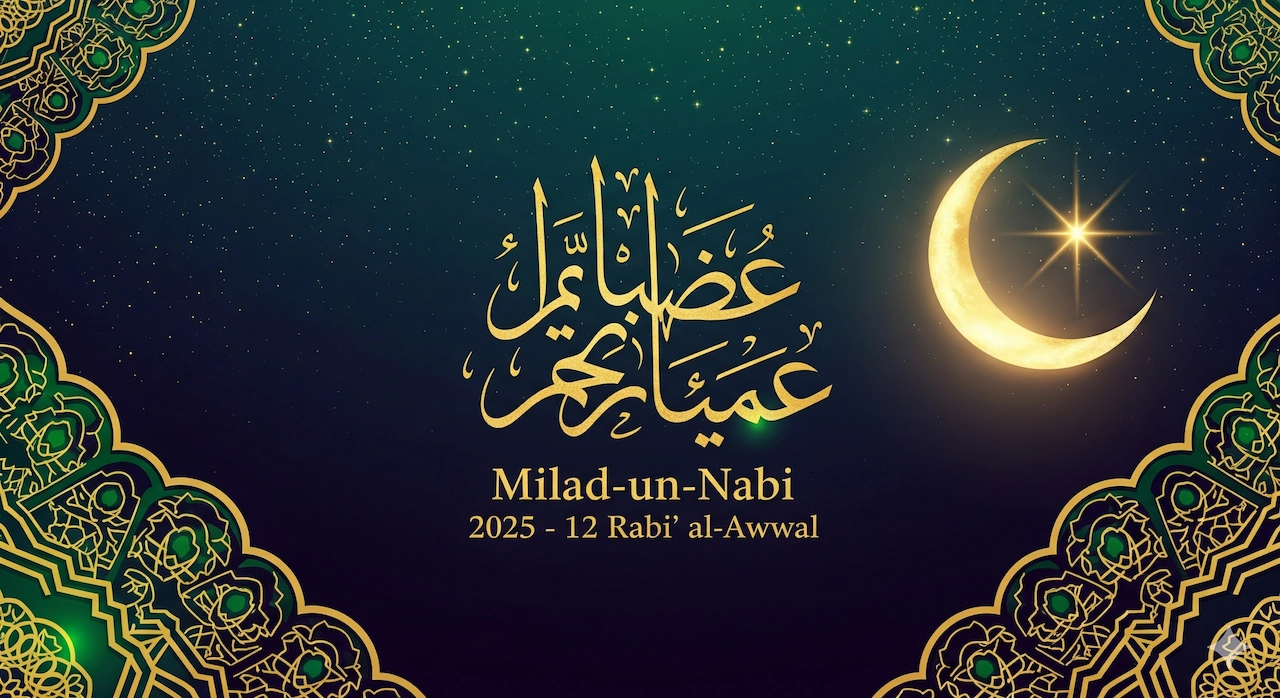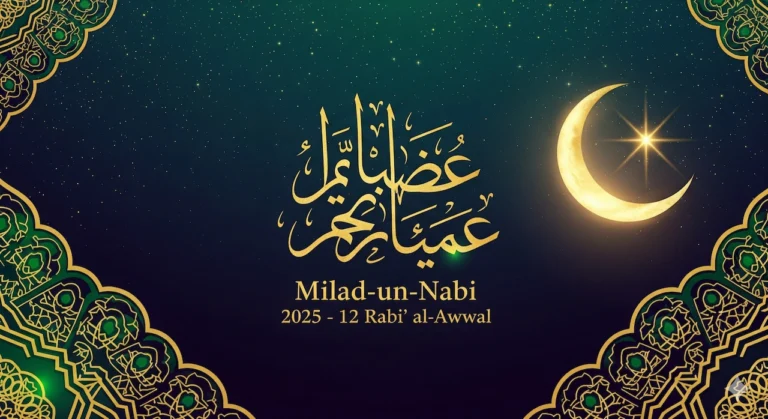Islam is a holistic way of life, characterized by a sacred calendar that marks pivotal moments for spiritual renewal, communal unity, and devotion. These special occasions are not mere holidays; they are carefully prescribed acts of worship (Ibadah) that reinforce a Muslim’s connection with Allah (SWT), the Prophet Muhammad (ﷺ), and the global Muslim community (Ummah).
This comprehensive pillar guide serves as your central resource, offering a detailed overview of the major Islamic events, their profound significance, the rituals (Ahkam), and the Sunnahs recommended for maximizing their spiritual reward.
The Concept of Special Islamic Events and Occasions

The Hijri Calendar (Lunar Calendar) governs Islamic life, ensuring that spiritual milestones cycle through the seasons, challenging believers year-round. These Islamic events transform daily routine into acts of profound worship, providing structure and discipline. They are the high-tides of the spiritual year, opportunities for increased reward and forgiveness.
Spiritual and Social Importance
- Spiritual Importance: These periods are sanctified times (Mawāsim al-Khair) where the reward for good deeds is multiplied. Forgiveness (Maghfirah) is readily available, encouraging Muslims to perform extra prayers, fast, and reflect deeply on their lives.
- Social Importance: Islamic events like Eid and the distribution of Qurbani meat actively promote social justice and empathy. They break down socioeconomic barriers, fostering a deep sense of belonging and unity within the Ummah. From shared Iftar meals to collective Eid prayers, they embody the Islamic principle of brotherhood.
Mention in the Quran and Sunnah
Every major event is rooted in the divine sources:
- The Quran explicitly commands fasting in Ramadan (Surah Al-Baqarah, 2:185) and the pilgrimage of Hajj (Surah Al-Imran, 3:97).
- The Sunnah (the practices of the Prophet Muhammad ﷺ), documented in Hadith, provides the practical, step-by-step methodology for performing these rituals, such as the exact manner of prayer, fasting, and pilgrimage.
These occasions, therefore, are integral to the practicing Muslim’s life, weaving devotion and community into the fabric of their existence.
1. Ramadan – The Month of Fasting

Ramadan is the ninth month of the Islamic calendar and is considered the holiest month. It is a period dedicated to intense spiritual discipline, self-control, and devotion.
Ramadan’s Importance (Qurani References)
Ramadan’s immense value stems from two facts: the divine command to fast and the revelation of the Quran.
“O you who have believed, fasting is decreed upon you as it was decreed upon those before you that you may become righteous.”
(Quran, Surah Al-Baqarah 2:183)
Furthermore, Allah states:
“The month of Ramadan is the one in which the Qur’an was revealed, a guidance for mankind and clear proofs for the guidance and the criterion (between right and wrong).”
(Quran, Surah Al-Baqarah 2:185)
Fasting Rules and Conditions (Siyam)
Fasting involves abstaining from food, drink, smoking, and marital intimacy from dawn (Fajr) until sunset (Maghrib).
- Eligibility: Fasting is obligatory upon every sane, mature (pubescent) Muslim who is not sick, traveling, menstruating, or pregnant/nursing.
- Intention (Niyyah): The intention to fast must be made before dawn each day.
- Exemptions: Those unable to fast due to permanent illness or old age must offer Fidya (a charitable compensation of feeding a poor person for each missed day).
Daily Routine During Ramadan
The rhythm of the month is dictated by pre-dawn and post-sunset meals:
- Suhoor (Pre-dawn Meal): A Sunnah act, highly encouraged for blessing and energy. It must be completed before the call to the Fajr prayer.
- Iftar (Sunset Meal): The meal to break the fast immediately after the Maghrib Adhan. It is Sunnah to break the fast with dates and water.
- Taraweeh (Night Prayer): Special congregational prayers performed after the Isha prayer. They are not obligatory but are a highly rewarding Sunnah.
- Qiyam ul-Layl (Late Night Prayer): Increased private prayer, especially in the last ten nights.
Laylat-ul-Qadr Introduction
Ramadan’s peak is the Night of Power (Laylat-ul-Qadr), hidden within the last ten odd nights. Worship on this single night is better than 1,000 months of regular worship.
Duas and Sunnahs for Ramadan
Niyyah for Fasting (Sehri): The most common intention, recited in Urdu/Roman English:
وَبِصَوْمِ غَدٍ نَّوَيْتُ مِنْ شَهْرِ رَمَضَانَ
“Wa bisawmi ghadinn nawaiytu min shahri Ramadan.”
(I intend to fast tomorrow for the month of Ramadan.)
Dua for Breaking Fast (Iftar):
اللَّهُمَّ إِنِّي لَكَ صُمْتُ وَبِكَ آمَنْتُ وَعَلَيْكَ تَوَكَّلْتُ وَعَلَى رِزْقِكَ أَفْطَرْتُ
“Allahumma inni laka sumtu wa bika aamantu wa ‘alayka tawakkaltu wa ‘ala rizqika-aftartu.”
(O Allah! I fasted for You, and I believe in You, and I put my trust in You, and with Your sustenance, I break my fast.)
- Key Sunnahs: Increasing charity (Sadaqah), reciting the entire Quran, and practicing I’tikaf (seclusion in the mosque) during the last ten days.
2. Laylat-ul-Qadr – The Night of Power
The most blessed night of the year, Laylat-ul-Qadr, is the culmination of the spiritual effort put forth in Ramadan.
Laylat-ul-Qadr’s Meaning and Significance
Laylat-ul-Qadr means the Night of Decree or the Night of Power. On this night, Allah decrees the events of the coming year for every individual. It is the night the Quran began its descent to the lowest heaven.
Quranic Ayah (Surah Al-Qadr)
The entire Surah 97, Al-Qadr, is dedicated to this night, stressing its unparalleled merit:
“Indeed, We sent the Qur’an down during the Night of Decree. And what can make you know what is the Night of Decree? The Night of Decree is better than a thousand months. The angels and the Spirit [Gabriel] descend therein by permission of their Lord for every matter. Peace it is until the emergence of dawn.”
Prophet ﷺ’s Actions During This Night
The Prophet Muhammad (ﷺ) would tighten his belt (meaning, he would stay away from his wives to dedicate himself fully to worship), stay awake, and rouse his family to worship during the last ten nights, particularly seeking this night.
Recommended Acts of Worship
- Qiyam (Standing in Prayer): Performing extra Nafl (voluntary) prayers, particularly the Tahajjud prayer.
- Dua (Supplication): The Prophet (ﷺ) advised reciting this specific Dua: “Allahumma innaka Afuwwun, tuhibbul-afwa, fa’fu anni.” (O Allah, You are The Pardoner, You love to pardon, so pardon me.)
- Dhikr (Remembrance): Frequent remembrance of Allah through recitation of the Quran, Tasbih (glorification), and Istighfar (seeking forgiveness).
3. Eid al-Fitr – Festival of Breaking the Fast
Eid al-Fitr marks the successful completion of the month of Ramadan, a celebration of spiritual achievement. It falls on the first day of Shawwal, the month immediately following Ramadan.
Eid al-Fitr’s Purpose and Origin
This Eid is a day of gratitude to Allah for enabling the Muslims to observe the fasts and benefit from the blessings of Ramadan. It is not just a reward but a communal declaration of faith and success in discipline.
Sunnahs of Eid Day
These actions are highly recommended by the Prophet (ﷺ):
- Ghusl (Full Purification Bath): Taking a bath before the Eid prayer.
- Eating Before Prayer: It is Sunnah to eat an odd number of dates before leaving for the Eid prayer, signifying the breaking of the fast.
- Wearing Best Clothes: Wearing one’s best clean clothes (new or old).
- Reciting Takbeer: Reciting the Takbeer (Allahu Akbar…) loudly on the way to the prayer ground.
- Using Different Routes: Going to the prayer ground by one route and returning by another.
Eid Prayer Method and Timing
The Eid prayer is a two-rak’ah congregational prayer performed outdoors or in a large mosque, usually shortly after sunrise. It is distinguished by extra Takbeerat (raising of hands and saying “Allahu Akbar“) at the beginning of the prayer. Unlike the Friday prayer, the Khutbah (sermon) is delivered after the prayer.
Charity (Zakat al-Fitr) Importance
Zakat al-Fitr is an obligatory charity paid before the Eid prayer.
- Purpose: To purify the fasting person from any indecent act or speech and to ensure that the poor are able to share in the joy of Eid.
- Amount: The amount is fixed (typically equivalent to one saa’ or 2.5–3 kg of a staple food like wheat or rice) and is paid per individual in the household, including babies.
4. Eid al-Adha – The Festival of Sacrifice
Eid al-Adha is the second major Islamic festival, celebrated on the 10th day of Dhul-Hijjah, the last month of the Islamic calendar, coinciding with the completion of the Hajj pilgrimage.
Story of Prophet Ibrahim (AS) and Ismail (AS)
The festival commemorates the ultimate test of faith of Prophet Ibrahim (Abraham), who was commanded by Allah in a dream to sacrifice his beloved son, Ismail. When Ibrahim showed his willingness to obey, Allah replaced Ismail with a ram to be sacrificed. This story embodies absolute submission to God’s will.
Significance of Sacrifice (Qurbani)
The annual sacrifice, also called Udhiyyah or Qurbani, is performed to symbolically reaffirm that spirit of submission. It is a reminder that a believer must be ready to sacrifice what is dearest to them for the sake of Allah.
Rules for Qurbani
- Obligation: The sacrifice is generally considered Wajib (necessary) upon every sane, mature Muslim who possesses the Nisab (minimum amount of wealth).
- Distribution: The meat of the sacrificed animal is traditionally divided into three parts: one for the immediate family, one for relatives and friends, and one for the poor and needy.
- Timing: The sacrifice must take place after the Eid prayer and before sunset on the 13th of Dhul-Hijjah.
Sunnahs of Eid al-Adha
- No Eating Before Prayer: Unlike Eid al-Fitr, it is Sunnah not to eat until after the Eid prayer, consuming the meat of the sacrificed animal first.
- Reciting Takbeer: The Takbeer is recited from the dawn of the Day of Arafah (9th Dhul-Hijjah) until the third day after Eid (13th Dhul-Hijjah).
5. Hajj – The Sacred Pilgrimage
Hajj is the annual pilgrimage to the Kaaba in Mecca and is one of the five pillars of Islam, obligatory once in a lifetime for every Muslim who is physically and financially able to undertake the journey.
Hajj’s Importance (5th Pillar of Islam)
Hajj is the ultimate act of worship, uniting Muslims from every corner of the globe in a single set of rituals over several days. It represents ultimate equality, repentance, and dedication to God.
Conditions and Eligibility
- Istiṭāʿah (Ability): The person must be physically and mentally healthy and possess sufficient funds for the journey and the sustenance of their dependants while away.
- Mahram: Women must be accompanied by a husband or a close male relative (
Mahram).
Step-by-Step Rituals of Hajj (Overview)
Hajj takes place from the 8th to the 12th of Dhul-Hijjah and includes several key stages:
- Ihram: Entering a state of consecration, wearing simple, unstitched white garments.
- Tawaf: Circling the Kaaba seven times.
- Sa’i: Walking seven times between the hills of Safa and Marwah.
- Waqf (Standing) at Arafah: The core ritual, spending the day of the 9th of Dhul-Hijjah in the Plains of Arafah in fervent prayer and reflection.
- Ramy (Stoning): Throwing pebbles at the three stone pillars in Mina, symbolizing the rejection of Satan.
- Sacrifice and Hair Clipping: Performing the Qurbani (for those not performing it locally) and clipping or shaving the hair.
Spiritual Lessons from Hajj
Hajj is a dress rehearsal for the Day of Judgment. The simple Ihram garment strips away all markers of wealth, status, and nationality, reinforcing the profound message that all humanity is equal before Allah.
6. Umrah – The Lesser Pilgrimage
Umrah is a pilgrimage to the Kaaba that can be performed at any time of the year.
Difference Between Hajj and Umrah
| Feature | Hajj | Umrah |
| Obligation | Obligatory (Fard) once in a lifetime. | Recommended (Sunnah Mu’akkadah). |
| Timing | Only during specific days of Dhul-Hijjah. | Can be performed at any time. |
| Rituals | Includes standing at Arafah and stoning the devils. | Consists only of Ihram, Tawaf, Sa’i, and hair clipping. |
Umrah Karne Ka Step-by-Step Method
- Ihram: Entering the state of Ihram at one of the designated Miqat points.
- Tawaf: Circling the Kaaba seven times.
- Sa’i: Walking between Safa and Marwah seven times.
- Hair Cutting: Men shave or clip their hair; women clip a small amount. This completes the Umrah.
Rewards and Virtues of Performing Umrah
The Prophet (ﷺ) said:
“Umrah is an expiation for the sins committed between it and the previous Umrah.”
(Bukhari)
Performing Umrah during Ramadan is considered equivalent to performing Hajj in terms of reward.
7. Ashura (10th Muharram)
Ashura is the 10th day of Muharram, the first month of the Islamic Hijri calendar.
Historical Significance of Ashura
Ashura holds great historical importance as the day when Prophet Musa (Moses) (AS) and the Israelites were miraculously saved from the tyrannical Pharaoh by the parting of the Red Sea.
It also holds significance for Shia Muslims as the day of the martyrdom of Husayn ibn Ali (the Prophet’s grandson) in Karbala.
Fasting on 9th and 10th Muharram
The Prophet Muhammad (ﷺ) saw the Jews of Medina fasting on this day and asked why. Upon learning its significance for Musa (AS), he said, “We are more worthy of Musa than you.” He then recommended fasting on Ashura.
- Sunnah Practice: Later, to differentiate the Muslim practice from the Jewish one, the Prophet (ﷺ) encouraged fasting the day before as well: the 9th and 10th of Muharram.
- Reward: Fasting on the Day of Ashura expiates the sins of the preceding year.
Lessons from the Story of Musa (AS)
The event is a powerful reminder of Allah’s power over oppressors, the ultimate triumph of truth over falsehood, and the need for patience and trust in divine help during adversity.
8. Milad-un-Nabi – Birth of the Prophet ﷺ

Milad-un-Nabi is the observance of the birthday of the Prophet Muhammad (ﷺ) on the 12th of Rabi’ al-Awwal.
Islamic Perspective on Celebrating Milad
While there are differing scholarly opinions on the permissibility of large-scale celebrations on this exact day, all Muslims agree that loving and honoring the Prophet (ﷺ) is an obligatory part of faith.
Seerah of the Prophet ﷺ as True Remembrance
The most universally accepted and rewarding way to honor the Prophet (ﷺ) is through:
- Following the Sunnah: Emulating his way of life in every aspect.
- Studying his
Seerah(Biography): Learning his character, teachings, and struggles. - Sending Blessings: Frequently reciting Salawat (Durood) upon him: “Allahumma Salli ‘ala Muhammad…”
Duas and Reflection
The true spirit of remembrance lies in renewing the covenant of obedience to his teachings and striving to be a better Muslim in light of his exemplary life.
Read More: Milad-un-Nabi 2025: Date, Significance & Perspective
9. Isra and Miraj – The Night Journey
The Isra and Miraj (The Night Journey and Ascension) is a miraculous journey undertaken by the Prophet Muhammad (ﷺ) in a single night from Mecca to Jerusalem and then up to the heavens. It usually falls on the 27th of Rajab.
Short Summary of the Event
- Al-Isra (The Night Journey): The Prophet (ﷺ) was transported from the Sacred Mosque in Mecca to the Farthest Mosque (
Masjid al-Aqsa) in Jerusalem. - Al-Mi’raj (The Ascension): From Jerusalem, he ascended through the seven heavens, met previous prophets, and was brought into the Divine Presence of Allah, where the five daily prayers were made obligatory upon the Muslim Ummah.
Quranic References and Hadith Mentions
The journey’s first part is mentioned in the Quran:
“Exalted is He who took His Servant by night from al-Masjid al-Haram to al-Masjid al-Aqsa, whose surroundings We have blessed, to show him of Our signs. Indeed, He is the Hearing, the Seeing.”
(Quran, Surah Al-Isra, 17:1)
The details of the ascension are established through numerous authentic Hadith.
Spiritual Lessons from the Journey
- Importance of Prayer: The event highlights the central role of the five daily prayers, which were personally gifted during the Mi’raj.
- Confirmation of Prophethood: It was a divine affirmation of the Prophet’s status and a great comfort to him during a time of immense difficulty.
10. Islamic New Year – Reflection & Resolutions
The Islamic New Year begins on the 1st of Muharram. It is a time of spiritual reflection rather than boisterous celebration.
Meaning of Hijri Calendar
The Hijri calendar marks its beginning not from the birth of a prophet, but from the Hijra (Migration) of the Prophet Muhammad (ﷺ) from Mecca to Medina in 622 CE. This event represents a turning point where the nascent Muslim community established a state based on Islamic principles.
Importance of Muharram as First Month
Muharram is considered one of the four sacred months in Islam, a time when fighting is prohibited and good deeds carry extra weight.
How Muslims Should Reflect on the Past Year
The New Year is a perfect opportunity for:
- Muhasabah (Self-Accountability): Reflecting honestly on one’s past year’s deeds—where one succeeded, failed, and fell short.
- Repentance (Tawbah): Seeking sincere forgiveness from Allah for all past shortcomings.
Spiritual Resolutions for the New Year
The ideal resolution is to improve one’s obligatory worship (prayers, fasting), increase voluntary acts, and improve character (Akhlaq).
Conclusion: Strengthening Imaan and Unity
The cycle of Islamic events—from the intense devotion of Ramadan to the communal sacrifice of Eid al-Adha and the global unity of Hajj—provides a structured path for every Muslim to nurture their faith (Imaan).
These events are designed by Allah to ensure that believers continuously renew their commitment, strengthen their bonds with one another, and maintain spiritual consistency throughout the year.
By diligently adhering to the Sunnahs and performing the rituals associated with these special occasions, we not only fulfill our religious duties but also find profound purpose, peace, and belonging in the global Ummah.

